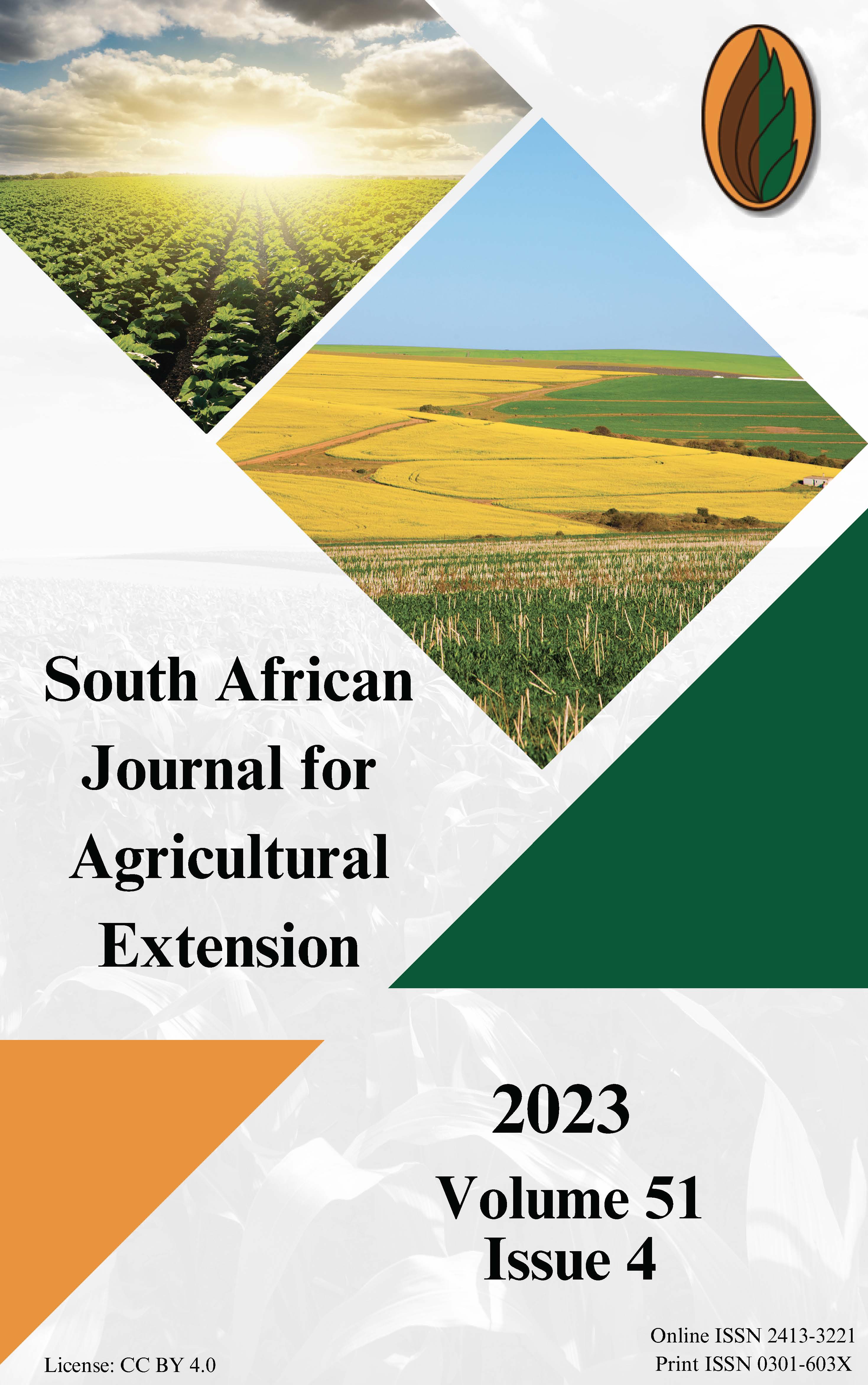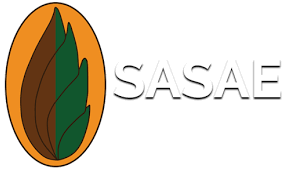Utilisation of Digital Technologies by Smallholder Farmers in South Africa
DOI:
https://doi.org/10.17159/2413-3221/2023/v51n4a15337Keywords:
Perception, Awareness, Constraints, Digital Technology, PerceptionsAbstract
The study's objective was to assess the utilisation of digital technologies by smallholder farmers, focusing on the types of digital technologies they use, their awareness and perceptions, and the constraints they face. The study used a systematic literature review design. The results show that there has been an increase in studies focussing on using digital technologies by smallholder farmers in South Africa. The focus has been on e-readiness, tools, and constraints in assisting smallholder farmers amongst extension workers, mainly from North West, KwaZulu-Natal, and Eastern Cape Provinces. Relevant topics have been smart farming, digital agriculture, adoption, and climate change. However, smallholder digital technology studies in South Africa have transitioned from small-scale agriculture and extension between 2012 and 2014 to transformation, food security and perception between 2014 and 2018, and innovations, communication technologies, and dissemination, more recently. Recent studies have focused on the productivity-enhanced adoption of ICTs, with various technologies used along the complexity spectrum. However, smallholder farmers have concentrated on low-tech digital technologies on the lower end of the complexity spectrum because they are more aware of them. End-user, service provider, and digital technology characteristics have constrained the use of digital technologies. In conclusion, smallholder farmers are aware of and use low-tech digital technologies limited by inherent internalised characteristics of the farmers themselves and the digital technologies.
Downloads
References
AKINSOLA, O.S., 2014. ICT adoption for bridging South African black farmers ’ knowledge gap. JAST., 2(1): 39–47. DOI: https://doi.org/10.14355/ijast.2014.0301.06
AKINSOLA, O.S. & DEHINBO, J.O., 2013. Internet-enabled platform for bridging South African emerging farmers’ knowledge gap. Paper presented in Proceedings of the International MultiConference of Engineers and Computer Scientists (IMECS), 13-15 March, Hong Kong.
ALANT, B.P. & BAKARE, O.O., 2021. A case study of the relationship between smallholder farmers’ ICT literacy levels and demographic data w.r.t. their use and adoption of ICT for weather forecasting. Heliyon., 7(3). DOI: https://doi.org/10.1016/j.heliyon.2021.e06403
AYIM, C., KASSAHUN, A., ADDISON, C. & TEKINERDOGAN, B., 2022. Adoption of ICT innovations in the agriculture sector in Africa: A review of the literature. Agric. Food Sec., 11(1): 1-16. DOI: https://doi.org/10.1186/s40066-022-00364-7
BASDEW, M., JIRI, O. & MAFONGOYA, P.L., 2017. Integration of indigenous and scientific knowledge in climate adaptation in KwaZulu-Natal, South Africa. Change Adapt. Socio-Ecol. Syst., 3(1): 56–67. DOI: https://doi.org/10.1515/cass-2017-0006
BILJON VAN, J. & KOTZÉ, P., 2008. Cultural factors in a mobile phone adoption and usage model. J Univers. Comput Sci., 14(16): 2650–2679.
BIRNER, R., DAUM, T. & PRAY, C., 2021. Who drives the digital revolution in agriculture? A review of supply-side trends, players and challenges. Appl Econ Perspect Policy., 43(4): 1260–1285. DOI: https://doi.org/10.1002/aepp.13145
BORN, L., CHIRINDA, N., MABAYA, E., AFUN-OGIDAN, O., GIRVETZ, E.H., JARVIS, A. & KROPFF, W., 2021. Digital Agriculture Profile: South Africa. Available from https://www.fao.org/3/cb2506en/cb2506en.pdf.
BUCHANA, Y., SITHOLE, M.M. & MJOKWENI, P., 2022. Adoption and diffusion of advanced ICTs in South Africa's agricultural sector: Policy issues and implications. Pretoria, South Africa.
BYAMUKAMA, W., KALIBWAMI, M.R. & MBABAZI, B.P., 2022. Information system (Is) models: Technology as a service for agricultural information dissemination in developing countries (Uganda ). A systematic literature review. IJSRM., 5(4): 42–54. DOI: https://doi.org/10.37502/IJSMR.2022.5404
CHANG, J., CHIU, P. & LAI, C., 2020. Implementation and evaluation of cloud-based e- learning in agricultural course. Interact. Learn. Environ., 31(2): 908-923. DOI: https://doi.org/10.1080/10494820.2020.1815217
CLOETE, E. & DOENS, M., 2010. B2B e-marketplace adoption in South African agriculture. Inf. Technol. Dev., 14(3): 184–196. DOI: https://doi.org/10.1002/itdj.20105
COOPER, H., 2010. Research synthesis and meta-analysis: A step-by-step approach. 5th edn. Sage.
DAVIS, F.D., 1989. Perceived usefulness, perceived ease of use, and user acceptance of information technology. MIS Quarterly., 13(3): 319–340. DOI: https://doi.org/10.2307/249008
DLAMINI, P. & OCHOLLA, D.N., 2018. Information and communication technology tools for managing indigenous knowledge in KwaZulu-Natal Province, South Africa. Afr. J. Libr. Arch. Inf. Sci., 28(2): 137–153.
DOP., 2012. National Development Plan 2030. Our future – make it work. Pretoria, South Africa.
DU, X., TEJEDA, H., YANG, Z. & LU, L., 2022. A general-equilibrium model of labor-saving technology adoption: Theory and evidences from robotic milking systems in Idaho. Sustainability., 14(13): 7683. DOI: https://doi.org/10.3390/su14137683
ERDOGDU, A.I., 2021. Social marketing of post-pandemic teleworking to improve the well-being of white-collar workers in Instanbul. Middle East Technical University.
FAO, IFAD, UNICEF, WFP & WHO., 2022. The state of food security and nutrition in the world: Repurposing food and agricultural policies to make healthy diets more affordable. Rome, Italy: FAO.
GAMUKAMA, E.A., 2015. Analytical modelling of Internet provision and usage in context of development through a utility based framework. Stockholm, Sweden.
HANAFIZADEH, P., KHOSRAVI, B. & TABATABAEIAN, S.H., 2020. Rethinking dominant theories used in information systems fi eld in the digital platform era. Digit. Policy, Regul. Gov., 22(4): 363–384. DOI: https://doi.org/10.1108/DPRG-09-2019-0076
JEMINE, G. & GUILLAUME, K., 2021. Lifting the veil on HRIS adoption : The role of vendors and consultants in the diffusion of HR innovations. Inf. Technol. People., 35(7): 2418-2440. DOI: https://doi.org/10.1108/ITP-02-2021-0114
JERE, N. & MAHARAJ, M.S., 2016. Evaluating the influence of information and communications technology on food security. S. Afr. J. Inf. Manag., 19(1): 1–7. DOI: https://doi.org/10.4102/sajim.v19i1.745
KLEINE, D., 2010. ICT4WHAT?—Using the choice framework to operationalise the capability approach to development. J. Int. Dev., 22(5): 674–692. DOI: https://doi.org/10.1002/jid.1719
LE, T.M., LIAW, S. & BUI, T., 2020. The role of perceived risk and trust propensity in the relationship between negative perceptions of applying big data analytics and consumers ’ responses’. WSEAS Trans. Bus. Econ., 17: 426–435. DOI: https://doi.org/10.37394/23207.2020.17.41
LIU, Y., LIU, C. & ZHOU, M., 2021. Does digital inclusive finance promote agricultural production for rural households in China ? Research based on the Chinese family database (CFD). China Agric. Econ. Rev., 13(2): 475–494. DOI: https://doi.org/10.1108/CAER-06-2020-0141
MABAYA, E. & PORCIELLO, J., 2022. Can digital solutions transform agri-food systems in Africa ? Can digital solutions transform agri-food systems in Africa ? Agrekon., 61(1): 67–79. DOI: https://doi.org/10.1080/03031853.2022.2032223
MABE, L.K., 2012. Constraints related to use of Information Communication Technologies tools among extension officers in the North- West Province, South Africa. Life Sci. J., 9(3): 1616–1619.
MABE, L.K. & OLADELE, I., 2012. Use of Information Communication Technologies tools among Extension officers in the North- West Province, South Africa. Life Sci. J., 9(4): 3275–3279.
MABE, L.K. & OLADELE, I., 2015. E-Readiness among male and female extension officers in North-West Province, South Africa. J. Agric. Food Inf., 16(4): 315–325. DOI: https://doi.org/10.1080/10496505.2015.1058166
MABE, L. & OLADELE, O., 2012. Awareness level of use of Information Communication Technologies tools among Extension officers in the North- West Province, South Africa. Life Sci. J., 9(3): 440–444.
MAKAULA, Z., 2021. Information and communication technologies (ICT) towards agricultural development in rural areas: case of smallholder farmers in Umzimvubu local municipality of the Eastern Cape Province in South Africa. S. Afr. J. Agric. Ext., 49(1): 81–90. DOI: https://doi.org/10.17159/2413-3221/2021/v49n1a10779
MAPIYE, O., MAKOMBE, G., MOLOTSI, A., DZAMA, K. & MAPIYE, C., 2021. Information and communication technologies (ICTs): The potential for enhancing the dissemination of agricultural information and services to smallholder farmers in sub-Saharan Africa. Info. Dev., p.02666669211064847. DOI: https://doi.org/10.1177/02666669211064847
MAUMBE, B., 2010. Mobile agriculture in South Africa: Implementation framework , value-added services and policy implication. IJICTRDA., 1(2): 35–59. DOI: https://doi.org/10.4018/jictrda.2010040103
MAUMBE, B.M. & OKELLO, J., 2013. Uses of information and communication technology (ICT) in agriculture and rural development in sub-saharan Africa: Experiences from South Africa and Kenya. Tech. Sustain. Rur. Dev. Afr., 1(1): 113–134. DOI: https://doi.org/10.4018/978-1-4666-3607-1.ch009
MAVILIA, R. & PISANI, R., 2022. Blockchain for agricultural sector: The case of South Africa. Afr. J. Sci. Tech. Innov. Dev., 14(3): 845–851. DOI: https://doi.org/10.1080/20421338.2021.1908660
MDODA, L. & MDIYA, L., 2022. Factors affecting the using information and communication technologies ( ICTs ) by livestock farmers in the Eastern Cape Province. Cogent Soc. Sci., 8(1). doi: 10.1080/23311886.2022.2026017. DOI: https://doi.org/10.1080/23311886.2022.2026017
MIGIRO, S.O. & KWAKE, A., 2007. Information needs and communication technology adoption in Africa: a comparative study of rural women in Kenya and South Africa. J. Soc. Dev. Afr., 22(1): 109–141.
MILLER, M. & MARIOLA, M.J., 2009. The discontinuance of environmental technologies in the humid yropics of Costa Rica: Results from a qualitative survey. Springer., 16(1): 31–42. DOI: https://doi.org/10.5191/jiaee.2009.16103
MUNYUA, H., 2007. ICTs and small-scale agriculture in Africa: A scoping study.
MUNYUA, H., ADERA, E. & JENSEN, M., 2009. Emerging ICTs and their potential in revitalizing small-scale agriculture in Africa. Agric. Inf. Worldw., 2(1): 3–9.
OLADIPO, O.D. & WYNAND, G., 2019. Agricultural production in South Africa: information and communication technology (ICT) spillover. Int. J. eBus. eGovernment Stud., 11(q): 166–190. DOI: https://doi.org/10.34111/ijebeg.20191126
OMULO, G. & KUMEH, E.M., 2020. Technological forecasting & social change farmer-to-farmer digital network as a strategy to strengthen agricultural performance in Kenya: A research note on “ Wefarm ” platform. Technol. Forecast. Soc. Change., 158: 120120. DOI: https://doi.org/10.1016/j.techfore.2020.120120
OTISO, K.M. & MOSELEY, W.G., 2009. Examining claims for information and communication technology-led development in Africa. Afr. Geogr. Rev., 28(1): 99–116. DOI: https://doi.org/10.1080/19376812.2009.9756219
POPOOLA, O.O., YUSUF, S.F.G. & MONDE, N., 2020. Information sources ad constrainyts in climate change adoptation amongst smallholder farmers in Amathole District Municipality, Eastern Cape Province. Sustainability (Switzerland)., 12(7): 20–24. DOI: https://doi.org/10.3390/su12072616
RAWAL, P., 2013. AIDA Marketing Communication Model: Stimulating a Purchase. IRC’s Int. J. Multidis. Res. Insoc. Manag. Sci., 1(1): 37–44.
ROGERS, E.M., 1983. Diffusion of innovation. 3rd edn. New York: The Free Press.
ROGERS, E.M., 1995. Diffusion of innovations. 4th edn. New York: The Free Press.
SIMPSON, A.P. & CALITZ, A.P., 2014. The use of mobile technologies amongst South African commercial farmers. S. Afr. J. Agric. Ext., 42: 98–107.
SMIDT, H.J., 2021. Factors affecting digital technology adoption by small-scale farmers in agriculture value chains (AVCs) in South Africa. Inf. Technol. Dev., 28(3): 558–584. DOI: https://doi.org/10.1080/02681102.2021.1975256
SRINUAN, C. & SEANGNOREE, A., 2014. Adoption of Thai rubber smallholders’ household on the use of ICT: A case of Southern Thailand. Presented at the The Asian Conference on Technology, Information & Society.
TEMBO, R. & MAUMBE, B.M., 2011. E-Agriculture Development in South Africa. Green Technologies: Concepts, Methodologies, Tools and Applications. IGI Global. DOI: https://doi.org/10.4018/978-1-60960-472-1.ch411
UN., 2022a. The Sustainable Development Goals report. Geneva, Switzerland.
UN., 2022b. World population prospects. New York, USA: United Nations.
VENKATESH, V., MORRIS, M.G., DAVIS, G.B. & DAVIS, F.D., 2003. User acceptance of information technology: Toward a unified view. MIS quarterly., 27(3): 425-478. DOI: https://doi.org/10.2307/30036540
WEBSTER, J. & WATSON, R.T., 2002. Analyzing the past to prepare for the future: Writing a literature review. MIS Quarterly., 26(2): xiii–xxiii.
WOODBURN, M.R., ORTMANN, G.F. & LEVIN, J.B., 1994. Computer use and factors influencing computer adoption among commercial farmers in Natal Province, South Africa. Comput Electron Agric., 11(2–3): 183–194. DOI: https://doi.org/10.1016/0168-1699(94)90007-8
ZANTSI, S. & NKUNJANA, T., 2021. A review of possibilities for using animal tracking devices to mitigate stock theft in smallholder livestock farming systems in rural South Africa. S. Afr. J. Agric. Ext., 49(1): 162–182. DOI: https://doi.org/10.17159/2413-3221/2021/v49n1a10784
Downloads
Published
Issue
Section
License
Copyright (c) 2023 N.V. Bontsa, A. Mushunje, S. Ngarava, L. Zhou

This work is licensed under a Creative Commons Attribution 4.0 International License.








.png)